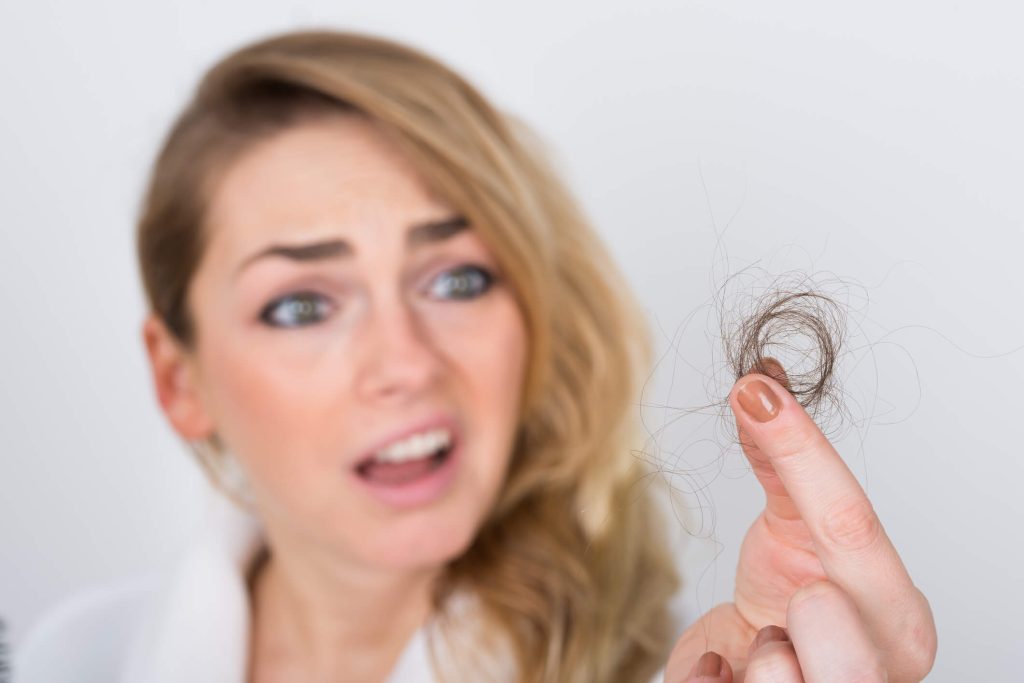Hair loss can be a frustrating and distressing experience. Whether it’s thinning hair, shedding, or receding hairlines, the causes can be numerous, one of the most common being vitamin deficiencies. Diet and nutrition play a crucial role in the overall health of your body, including your hair. Nutritional imbalances can directly impact the health of your hair follicles, affecting the natural hair growth cycle. In this article, we’ll explore the connection between vitamin deficiencies and hair loss, highlighting key vitamins and minerals that play essential roles in maintaining hair health and the importance of protein and keratin in hair structure and strength. Studies have shown that proper nutrition is vital for hair health and can help address an underlying condition contributing to hair thinning and loss.
The Role of Vitamins in Hair Health
Vitamins are vital for overall health, particularly for hair growth and health. Hair loss or thinning hair can result from various deficiencies, ranging from vitamin D to biotin and vitamin B12. Weight loss, medications, and vitamin D levels can also impact hair growth. B vitamins, including B6, B12, and folic acid, play crucial roles in the hair growth cycle and maintaining healthy hair follicles. For example, hairs can become weak or fall out due to a lack of these essential nutrients. Let’s dive deeper into how these key vitamins contribute to hair health.
Vitamin D: Essential for Hair Follicle Function
Vitamin D plays a crucial role in the health of your hair follicles, encouraging the growth and development of new hair. When vitamin D levels are low, the hair follicles may enter a resting phase, leading to hair shedding and possible thinning. Vitamin D deficiency can result in poor hair health and slower regrowth. Adequate vitamin D levels are essential for hair regrowth and follicle activation, particularly for people with conditions like psoriasis, which can affect the scalp. Research has shown the benefits of maintaining optimal vitamin D levels for improving hair growth. Incorporating it into your lifestyle through sun exposure, food, and supplements is crucial to support healthy vitamin D levels. For those experiencing thinning or shedding, following simple advice and tips can make a difference in overall hair health.
Vitamin D is naturally obtained from sunlight, but it’s also found in foods such as fatty fish, fortified dairy products, and egg yolks. People may sometimes require vitamin D supplements to address deficiencies, especially if they live in regions with limited sunlight or have difficulty absorbing this vitamin from food. Evidence supports that proper diagnosis and supplementation can help restore vitamin D levels, potentially improving hair health. It’s essential to recognize that other micronutrients also play a role in hair growth, and addressing deficiencies in these areas can further support your hair’s health. There are several ways to ensure you get enough of these essential nutrients, and understanding how they interact can help prevent or treat hair loss caused by various diseases.
Vitamin A: Supporting Healthy Scalp and Hair Growth
Vitamin A is essential for producing sebum, an oily substance that helps keep the scalp moisturized. A deficiency in vitamin A can result in dry, brittle hair and an unhealthy scalp, contributing to hair loss. However, excess vitamin A can also lead to hair thinning or baldness, so it’s essential to maintain a balance. The information on vitamin A suggests a range of recommended daily values to avoid both deficiency and toxicity. This is especially relevant for adults, as the amount of vitamin A needed varies based on age, gender, and health conditions. Proper treatment options are available for those experiencing hair loss due to vitamin A imbalance, and a consultation with a healthcare provider, such as an MD, can help tailor a solution. Adjusting diets to include the proper vitamin A levels through foods like carrots, sweet potatoes, and spinach can help promote healthy hair.
Foods like carrots, sweet potatoes, spinach, and kale are excellent sources of vitamin A, and they can help promote healthy hair growth by supporting scalp health and providing the right environment for hair follicles to thrive. The vitamin A content in these foods varies, but they all offer valuable amounts to support hair health. However, it’s important not to consume too much vitamin A, as an excess can lead to hair thinning. A study can shed light on the steps you can take to achieve the right balance. Different foods provide varying types and levels of vitamin A, so incorporating a variety of nutrient-rich foods into your diet is essential to optimize hair growth and overall scalp health. Riboflavin also plays a vital role in maintaining the health of hair follicles and can support hair growth when included in your daily nutrition.
Biotin: The Superstar of Hair Health
Biotin, also known as vitamin B7, is one of the most well-known vitamins for hair growth. A biotin deficiency can result in hair thinning, hair shedding, and brittle nails. Biotin strengthens the hair shaft and supports the growth of healthy hair follicles. It’s a common ingredient in hair supplements, and many people use it to treat hair thinning and shedding. However, it’s essential to understand that a different biotin supplement is available, and others may also address hair health concerns. If you’re facing this issue, it’s best to consult a doctor or one of the many specialized doctors in the field to determine the best approach. They may recommend a blood test to check your zinc levels or assess your nutritional status to ensure you get the necessary vitamins for optimal cell growth and hair health.
While biotin supplements are widely used, biotin can also be obtained through food sources like eggs, nuts, seeds, and leafy green vegetables. Vitamin B6, another B vitamin, also plays a vital role in follicle development, helping to maintain a healthy scalp and hair growth cycle. Research findings have shown that proper intake of these vitamins is crucial for overall hair health. Signs of deficiency may include thinning hair, dry scalp, and breakage. In addition to biotin and B6, other proteins in the diet, such as keratin, also support healthy hair. Maintaining adequate B vitamins like niacin is essential for preserving a woman’s hair’s thickness and strength. Keeping these nutrients in mind when considering dietary changes can help prevent deficiencies. A doctor may recommend a substitute or supplementation to help meet the necessary levels. For more detailed guidance, you can find helpful articles on vitamin deficiencies and hair health.
Vitamin B12: Crucial for Oxygen Delivery to Hair Follicles
Vitamin B12 is essential for forming red blood cells, which carry oxygen throughout the body. Oxygen is necessary for the proper function of hair follicles, and without adequate vitamin B12, the follicles may not receive the oxygen they need to support healthy hair growth. A deficiency in B12 can lead to hair thinning and excessive hair shedding. Additionally, vitamin B12 plays a role in maintaining the health of bones, ensuring overall well-being. The effect of a B12 deficiency on hair health has been studied by researchers, who have found that inadequate levels can contribute to hair loss. The reason for this is the lack of oxygen reaching the hair follicles, which disrupts the natural hair growth cycle. In recent news, researchers have made advancements in understanding how vitamin B12 deficiency leads to hair problems and the potential for vitamin supplements to prevent these problems. Some individuals may also experience patches of hair loss due to this deficiency, which can affect both the scalp and overall hair density.
People with low B12 levels may experience fatigue, weakness, pale skin, and hair thinning. Vegetarians and vegans are particularly at risk of B12 deficiency, as this vitamin is primarily found in animal-based products like meat, dairy, and eggs. In such cases, B12 supplements or fortified plant-based foods may be necessary. Reviewing your vitamin levels regularly is essential, especially if you have dietary restrictions. A vitamin E deficiency can also contribute to hair loss, further affecting overall health. Low levels of B12 can be particularly impactful for men, leading to physical and hair-related issues. To ensure that you are getting adequate nutrients, blood tests can help confirm if a deficiency is present and guide you toward the best course of treatment.
Vitamin C: Protecting Hair from Free Radicals
Vitamin C is a powerful antioxidant that helps protect hair follicles from damage caused by free radicals. It also promotes the production of collagen, which is crucial for maintaining the strength and elasticity of hair strands. Vitamin C deficiency can lead to hair loss and weak hair shafts, so adequate vitamin C intake is vital for healthy hair growth. The effects of a vitamin C deficiency on hair health can be significant, leading to brittle and weakened hair. Various strategies to increase vitamin C intake include eating citrus fruits, berries, and leafy greens. The link between vitamin C and hair health is well-established, with many studies highlighting its importance. On the other hand, insufficient absorption of vitamin C can exacerbate the problem of hair thinning. To address this, ensure you are consuming vitamin C in a way that supports your body’s needs, including through diet or supplements if necessary.
Foods rich in vitamin C include citrus fruits, strawberries, bell peppers, and broccoli. If you’re experiencing hair loss, increasing your intake of vitamin C-rich foods can help support the strength and health of your hair. You can incorporate these into your daily meals and other nutrient-dense options like milk to boost your vitamin intake. If you have questions about vitamin C levels or the best foods to promote hair health, consulting a healthcare professional can provide guidance. Vitamin C also helps combat inflammation in the scalp, which can sometimes contribute to hairline issues. This is especially important for females experiencing hair thinning, as the scalp’s condition can directly impact hair growth. Monitoring your vitamin levels to ensure you get the proper nutrients for hair health, preventing issues like thinning or shedding, especially near the hairline.
The Importance of Minerals in Hair Growth
Along with vitamins, minerals also play a crucial role in the health and growth of your hair. Nutrients like iron, zinc, and selenium contribute to maintaining hair follicles, boosting circulation to the scalp, and supporting the overall hair growth cycle. On the other hand, it’s essential to ensure you’re getting enough vitamin B2, also known as riboflavin, which helps improve the condition of your scalp and hair. Any deficiencies in these minerals can lead to weakened hair growth or thinning. For individuals seeking professional guidance, dermatology clinics can offer access to treatments and advice on maintaining a healthy scalp and hair. Hair loss is increasing, and addressing mineral deficiencies is essential to managing this condition.
Iron: Delivering Oxygen to Hair Follicles
Iron helps produce red blood cells, which carry oxygen to the hair follicles. Without enough iron, the follicles may not receive the oxygen they need to function correctly, leading to hair loss. Iron deficiency anemia is one of the most common causes of hair shedding, particularly in women. Iron is crucial in supporting your hair’s immune function and overall health. The body may struggle to repair damage and support growth without sufficient iron. In severe cases, a lack of iron can even result in conditions like scurvy, which can further affect the hair’s health. Ensuring the proper allowance of iron through diet and supplementation can prevent these issues, promoting healthy hair growth from the head down.
Iron-rich foods like spinach, red meat, poultry, lentils, and tofu can help boost iron levels. If dietary changes aren’t enough, iron supplements may be recommended by a healthcare provider to restore healthy hair growth. Results from various studies and case reports indicate that supplementing with iron can significantly improve hair health, particularly in individuals with low iron levels. Supplements come in different units for those requiring higher doses, and healthcare professionals can guide the proper dosage. If your doctor prescribes iron, they may recommend taking it as care IU or plasma to ensure proper absorption and effectiveness in replenishing iron levels. This can help prevent hair thinning and shedding caused by iron deficiency.
Zinc: Strengthening Hair Follicles
Zinc plays a vital role in hair follicle health by helping to regulate oil production in the scalp and promoting the health of hair strands. Zinc also supports the immune system, which is crucial for maintaining a healthy scalp. A zinc deficiency can lead to hair thinning and loss. Studies and a case report show that zinc deficiencies can negatively impact hair growth, especially in children, as it affects hair follicle development. Zinc helps in the production of serum proteins that are essential for maintaining a healthy scalp and hair follicles. Adequate zinc levels also ensure a steady supply of nutrients to the hair follicles. Additionally, zinc plays a role in producing hemoglobin, the protein in red blood cells that carries oxygen, essential for nourishing hair follicles and promoting healthy hair growth.
Zinc-rich foods like oysters, red meat, pumpkin seeds, and lentils can help address zinc deficiency. For individuals with severe deficiencies, zinc supplementation may be necessary. Getty Images often highlights the importance of zinc for hair health in various articles, showcasing its vital functions in hair growth. Times of high stress or poor diet can lead to hair thinning, making it essential to address nutrient deficiencies. Some individuals may also turn to treatments like minoxidil to support hair regrowth, though addressing underlying deficiencies, like zinc, can enhance the overall effectiveness of these products.
Selenium: Protecting the Scalp from Oxidative Stress
Selenium is another antioxidant that helps protect the scalp from damage caused by free radicals. A selenium deficiency can lead to weakened hair follicles and hair loss. Selenium supports the healthy functioning of the hair growth cycle and helps the follicles regenerate. In combination with other essential vitamins and minerals, selenium can enhance hair health. As with any treatment, respecting individuals’ rights and privacy choices, particularly regarding personal health information, is essential. Research by experts like Almohanna HM has shown the benefits of selenium in hair growth and follicle regeneration. This study also emphasizes how the rate of hair regrowth can be improved when selenium is part of a balanced diet.
Selenium is found in foods such as Brazil nuts, fish, and eggs. As with other minerals, selenium supplementation may be necessary for individuals with a deficiency. Selenium is often used to support the health of hair follicles and promote hair regeneration.
Neograft Hair Restoration: A Solution for Hair Loss
If you are experiencing hair loss due to vitamin and mineral deficiencies or other causes like stress, hormonal changes, or genetics, Neograft Hair Restoration may be the solution. Neograft is a minimally invasive procedure that helps people achieve natural-looking hair regrowth.
Neograft uses a technique called Follicular Unit Extraction (FUE), which involves extracting healthy hair follicles from the donor area and transplanting them into thinning or balding areas. This method ensures that the hair grows naturally and seamlessly, giving patients a fuller, more youthful appearance.
If you’re considering hair restoration, Neograft could be the right option. Schedule a consultation with a healthcare provider to discuss your hair loss concerns and whether Neograft is right for you.
Other Factors Contributing to Hair Loss
In addition to vitamin deficiencies, stress, hormonal imbalances, and genetics can also contribute to hair loss. Conditions like alopecia areata, telogen effluvium, and pattern baldness can lead to thinning hair or complete hair loss. Hair loss during pregnancy is another common concern for many women, as hormonal changes can cause temporary shedding or thinning, often resolving after childbirth.
Alopecia areata is an autoimmune disease that attacks hair follicles, causing patchy hair loss. Telogen effluvium is often triggered by stress or illness, causing temporary hair shedding. If you are experiencing significant hair thinning or shedding, it’s essential to consult with a healthcare provider or dermatologist to determine the underlying cause. Things to Avoid When You Have Alopecia Areata include tight hairstyles, harsh hair treatments, and stress, which can worsen and prevent hair regrowth.
Vitamin Deficiencies and Their Impact on Hair Growth
Vitamin deficiencies can have a significant impact on your hair health. Folic acid, vitamin E, biotin, vitamin B6, and vitamin B9 (folate) are all essential for maintaining healthy hair follicles and promoting regrowth. A biotin supplement may help support hair health, especially if you have a deficiency.
Vitamin B9 (folate) is essential for cellular function and blood circulation, which can affect hair growth. Consuming adequate amounts of vitamin B9 in foods like leafy greens, citrus fruits, and fortified grains can support overall hair health.
If you’re experiencing vitamin deficiencies, consider getting a blood test to identify your needs. A healthcare provider can offer guidance on proper supplementation and help you develop a treatment plan tailored to your needs.
Conclusion
Vitamin and mineral deficiencies can significantly affect hair health, leading to thinning, shedding, and even permanent hair loss. Ensuring adequate essential vitamins like vitamin D, biotin, vitamin A, and iron can support healthy hair growth. Along with vitamins, minerals like zinc, selenium, and iron are vital for maintaining strong and healthy hair follicles.
If you’re struggling with hair loss, whether due to vitamin deficiencies or other underlying causes, Neograft Hair Restoration offers a safe and effective solution for hair regrowth. By addressing nutritional deficiencies and considering professional treatments, you can restore the health and thickness of your hair, regaining confidence and promoting overall well-being.
Frequently Asked Questions
Can Hormonal Changes Cause Hair Loss?
Yes, hormonal imbalances due to pregnancy, menopause, thyroid issues, or birth control can lead to hair thinning or shedding. If you suspect hormonal imbalances contribute to hair loss, it’s best to consult a doctor to evaluate and manage the condition.
What Role Does Protein Play in Hair Health?
Hair is made up of keratin, a type of protein, so ensuring sufficient protein intake is essential for maintaining strong, healthy hair. Protein deficiencies can lead to brittle hair or hair loss. Including lean meats, eggs, legumes, and nuts in your diet can help boost protein levels.
How Does Iron Deficiency Affect Hair Growth?
Iron is crucial for oxygenating hair follicles; lacking iron can lead to hair thinning or shedding. Iron-rich foods like spinach, lentils, and red meat can help prevent deficiencies, but in some cases, iron supplements may be necessary.
Is It Safe to Use Biotin Supplements for Hair Growth?
Biotin, or vitamin B7, can strengthen hair and promote growth, especially for those with a deficiency. However, it’s essential to consult a healthcare provider before starting biotin supplements, as the effectiveness can vary, and excessive biotin intake can cause side effects.
Can Overwashing Hair Lead to Hair Loss?
Overwashing can strip the scalp of natural oils, leading to dry, brittle hair, which can break more easily. It’s best to wash hair 2-3 times a week, depending on hair type, and use gentle, sulfate-free shampoos to maintain a healthy scalp and prevent unnecessary hair loss.
How Can Stress Contribute to Hair Loss?
Stress can trigger hair loss through telogen effluvium, where hair follicles enter a resting phase due to physical or emotional stress. After a few months, more hair than usual falls out. Managing stress through relaxation techniques, exercise, and sleep can help reduce hair loss.
What is the Connection Between Zinc and Hair Health?
Zinc supports hair growth by aiding in cell division and protein synthesis. A zinc deficiency can cause hair thinning and slow growth. Foods like pumpkin seeds, lentils, and meat are good sources of zinc, and supplements may be helpful for severe deficiencies.
Does Vitamin C Help in Hair Growth?
Vitamin C is an antioxidant that helps protect hair follicles from oxidative stress and supports collagen production, which strengthens hair. A deficiency can lead to brittle hair. Eating citrus fruits, strawberries, and broccoli can improve hair health.
Can Certain Medications Cause Hair Loss?
Yes, medications such as chemotherapy drugs, blood thinners, and antidepressants can cause hair loss as a side effect. If you believe a medication is affecting your hair, consult your healthcare provider for potential alternatives or adjustments.
What Are the Benefits of Selenium for Hair Health?
Selenium is an antioxidant that protects hair follicles from free radicals, promoting healthier hair growth. A selenium deficiency can weaken hair and cause loss. Foods like Brazil nuts, fish, and eggs are rich in selenium and can help maintain optimal hair health.















Recent Comments